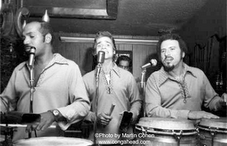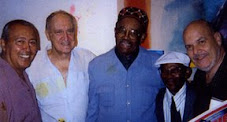
As I write, the Septeto Nacional is playing “Echale salsita” and “El son es lo mas sublime para…,” right here in New York. Ignacio Piñeiro was a contemporary of the most popular bandleader of the 1930s, Paul Whiteman, was billed as the King of Jazz. Naturally, black musicians protested the white man’s gratuitous label (as B.B. King would become their king.) Whiteman, as we believe, also influenced Ignacio when he introduced the phrases “get hot” and “hot stuff.” The salsita connection is evident and was also popular with black jazz musicians. Latin composers contributed “Calientico,” a popular rumba at that time, and spiced-up tunes.
When African-rooted jazz musicians began to hear Miguelito Valdes’ Yoruba-authentic ritual incantations such as “Bruca manigua” and “Babalu,” and Arsenio Rodriguez’s “Sabroso y caliente” and wild “bembes lucumies,” and Chano Pozo (as, later, Celia Cruz would sing “El Quimbo”), they tried to adopt these odd-sounding chants. But ended up with “heidi, heidi, ho,” “cubop, bebop,” “rumba boogie,” and whatnot.
“La-di-o-de” is a sacred invocation. Latino musicians did not protest what could have been called an insult to their patrimony.
Music is aria made sonorous, and humans will produce it as part of our seventh sense: the sense of rhythm that resides in our brains. That sense is in the company of our other senses, including our sense of balance, located not in our feet, but in our ears.
It doesn’t matter who influences who, but to the struggling musicians of El Barrio, it mattered. Last year, Willie Colon, playing New Year’s Eve at Del Posto Restaurant in Manhattan’s meat-packing district, was able to advertise: $850 per person for admission! Sold out! Musicians can never be paid enough. Let’s remember, it was music that helped bring us out of the Great Depression, not the bankers. We sang “Happy days are here again” throughout the country, and the musicians were our pied pipers.
Speaking of mimicking, in the dance world, the Twist was an explosive effort, and sad excuse to deride, willfully or not, the hip movements of the rumba, humorously. Anglos had uptight social attitudes that were made acceptable under the cloak of comedy, like minstrels. The playful Twist became the forerunner of Elvis’ rock ‘n roll show, with roots in the South. (Webster’s dictionary claims that rock ‘n roll “derived from rhythm and blues,” but I say it was the Twist.) If the Twist had gone north, and on into mambo instead, imagine what our culture would have become! Elvis never learned salsa and if he had I’m sure our colleges would have less trouble teaching Spanish, for one thing.
I’ve heard many bad rock ‘n roll bands, but never a bad conjunto. Are the hundreds of pop groups trying to reach the heights of the salseros? African drums have saved many Latin jazz performances, but can we please get rid of those big, fake conga prop drums on Jay Leno’s show? Why don’t we have a term, Afro-jazz? Who can dance salsa wearing a Mexican sombrero, and how many of us can dance a Dancing With the Stars salsa?
When African-rooted jazz musicians began to hear Miguelito Valdes’ Yoruba-authentic ritual incantations such as “Bruca manigua” and “Babalu,” and Arsenio Rodriguez’s “Sabroso y caliente” and wild “bembes lucumies,” and Chano Pozo (as, later, Celia Cruz would sing “El Quimbo”), they tried to adopt these odd-sounding chants. But ended up with “heidi, heidi, ho,” “cubop, bebop,” “rumba boogie,” and whatnot.
“La-di-o-de” is a sacred invocation. Latino musicians did not protest what could have been called an insult to their patrimony.
Music is aria made sonorous, and humans will produce it as part of our seventh sense: the sense of rhythm that resides in our brains. That sense is in the company of our other senses, including our sense of balance, located not in our feet, but in our ears.
It doesn’t matter who influences who, but to the struggling musicians of El Barrio, it mattered. Last year, Willie Colon, playing New Year’s Eve at Del Posto Restaurant in Manhattan’s meat-packing district, was able to advertise: $850 per person for admission! Sold out! Musicians can never be paid enough. Let’s remember, it was music that helped bring us out of the Great Depression, not the bankers. We sang “Happy days are here again” throughout the country, and the musicians were our pied pipers.
Speaking of mimicking, in the dance world, the Twist was an explosive effort, and sad excuse to deride, willfully or not, the hip movements of the rumba, humorously. Anglos had uptight social attitudes that were made acceptable under the cloak of comedy, like minstrels. The playful Twist became the forerunner of Elvis’ rock ‘n roll show, with roots in the South. (Webster’s dictionary claims that rock ‘n roll “derived from rhythm and blues,” but I say it was the Twist.) If the Twist had gone north, and on into mambo instead, imagine what our culture would have become! Elvis never learned salsa and if he had I’m sure our colleges would have less trouble teaching Spanish, for one thing.
I’ve heard many bad rock ‘n roll bands, but never a bad conjunto. Are the hundreds of pop groups trying to reach the heights of the salseros? African drums have saved many Latin jazz performances, but can we please get rid of those big, fake conga prop drums on Jay Leno’s show? Why don’t we have a term, Afro-jazz? Who can dance salsa wearing a Mexican sombrero, and how many of us can dance a Dancing With the Stars salsa?


1 comment:
Dapoxetine 60mg Bestellen Deutschland ist eine sichere Möglichkeit für Männer, die unter vorzeitigem Samenerguss leiden. Dieses Medikament hilft, die Kontrolle zu verbessern und das Sexualleben zu verlängern. Dank diskreter Online-Apotheken können Sie Dapoxetine 60mg ohne Rezept bestellen und bequem nach Hause liefern lassen. Viele Männer in Deutschland berichten von mehr Selbstvertrauen und einer besseren Intimität durch die Einnahme von Dapoxetine. Bestellen Sie jetzt Dapoxetine 60mg und genießen Sie eine zuverlässige Lösung für mehr Kontrolle und Zufriedenheit im Liebesleben.
😍👇SHOP NOW😍👇
Dapoxetine 60mg Bestellen Deutschland
Post a Comment